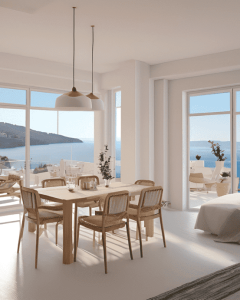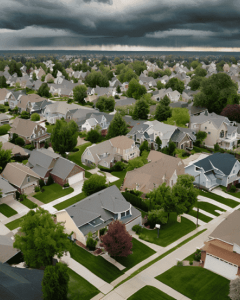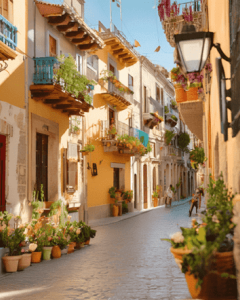The Rise of Tiny Houses in France: Affordable Eco-Friendly Options
Tiny houses are surging in popularity across France, offering innovative and eco-friendly living solutions. As costs rise, these compact homes provide an affordable alternative for those seeking sustainability and creativity in their living spaces.
In the face of escalating costs, the allure of eco-friendly, innovative housing solutionsremains steadfast. Nearly a decade has elapsed since the ‘tiny house’ phenomenon took root in France, and while the number of these diminutive dwellings continues to proliferate, so too do their price tags. Initially embraced by environmentally conscious individuals enchanted by the prospect of compact, well-insulated homes—akin to oversized garden sheds—these properties promised all the comforts of larger residences without the accompanying financial burden.
Typically, a tiny house spans no more than 37 square meters. To facilitate the burgeoning interest, various associations have emerged to assist builders and provide guidance. The preeminent organization, Tiny House France, highlights a significant shift in pricing: key-in-hand models that averaged €25,000 a decade ago now commence at approximately €30,000, with fully equipped versions often exceeding €100,000, particularly those boasting cutting-edge technology. The affordability of these homes is not solely attributable to their modest dimensions; many components are prefabricated, and complete kits are available for the intrepid DIY enthusiast, generally priced around €20,000. For a budget of €100,000, one can expect to acquire a dwelling with 30 square meters of living space, inclusive of installation costs.
On the regulatory front, the murky legal landscape surrounding tiny house installations has seen considerable clarification. A pivotal distinction lies in whether the homes are wheeled or fixed. Wheeled versions are classified as caravans, permitting placement on any land without prior authorization for up to three months annually. Beyond this timeframe, approval from the local mairie is requisite. Notably, wheeled tiny houses are exempt from taxation; however, they cannot be connected to utilities and are not recognized as legal residences.
For fixed structures measuring under 5 square meters, no authorization is necessary. For those ranging from 5 to 20 square meters, a déclaration préalable must be submitted to the mairie for permanent installations, incurring a one-time taxe d'aménagement that varies from a few hundred euros to over €1,000, contingent on size. Annual taxe foncière obligations will also increase. Structures exceeding 20 square meters necessitate a full permis de construire. Applicants may undertake the process independently, often utilizing drawings provided by the builder, or engage a professional—typically recommended by the builder—for a fee ranging from €1,000 to €2,000. Regardless of size, tiny houses must adhere to the same health and safety standards as their larger counterparts: they must be leak-proof, equipped with utilities (usually at a cost of €1,500 to €3,000), and feature operational toilets, showers, sinks, fireproofing, and heating systems.
The health and safety regulations further stipulate that renting a tiny house under 9 square meters is prohibited. For slightly larger properties, rental agreements can be established via a location saisonnière contract, offering greater flexibility without a rental ceiling. For long-term rentals, where the tenant occupies the house as their primary residence, the government’s Agence nationale pour l’information sur le logement (Anil) advises that access rights to the tiny house be explicitly detailed in the contract, even if access is through a separate garden gate. Additionally, communal living arrangements, such as barbecue permissions in the garden, should be delineated in the contract. Anil and other authorities caution that constructing a tiny house as a rental investment carries inherent risks—finding tenants can prove challenging, as not everyone is enamored with the concept. Prospective landlords must also consider their comfort level with having tenants residing in their garden.
Five regions in France have initiated policies to bolster tiny house construction. Brittany has integrated these homes into its overarching ecological strategy, resulting in several municipalities permitting tiny houses in areas previously designated as non-constructible terrain, as well as in ‘éco-hameaux’ aimed at alternative housing solutions. In Occitanie, efforts have concentrated on incorporating tiny houses into urban and peri-urban locales through collaborations among local authorities, associations, and private developers, culminating in dedicated lotissements (housing developments) for their construction. Auvergne-Rhône-Alpes has prioritized communication, disseminating leaflets from the regional council that elucidate the tiny house concept and outline the necessary steps for prospective buyers or builders. Meanwhile, in the densely populated Ile-de-France region, initiatives to situate tiny houses in underutilized urban spaces have garnered positive feedback from local councils, with some areas employing these homes to mitigate the prevalence of second residences and enhance affordable housing options.
In Haut-Jura (Bourgogne-Franche-Comté), a ‘small hamlet’ of flat-pack homes is under construction, designated exclusively for permanent residents. The homes in La Pesse will be owned by the local authority and rented at rates ranging from €100 to €250 per month. Each unit will measure under 40 square meters, accompanied by 200 square meters of garden space, and will encompass all essential amenities for comfortable living. The ambitious goal is to establish five to ten homes by 2026, in stark contrast to the average house price in the vicinity—hovering between €400,000 and €500,000—where approximately 40% of the housing stock comprises second homes.
The Rise of Tiny Houses in France: Affordable Eco-Friendly Options
Greece Real Estate Market: Rise of Serviced Apartments
Explore the growing demand for serviced apartments in central Athens, where integrated hospitality services attract savvy investors in the Greece real estate market.
Explore the growing demand for serviced apartments in central Athens, where integrated hospitality services attract savvy investors in the Greece real estate market.
Read moreHome Prices Hit by Climate Change, J.P. Morgan Warns
J.P. Morgan analysts reveal a negative link between climate risk and home price appreciation. Explore the emerging trends and their impact.
J.P. Morgan analysts reveal a negative link between climate risk and home price appreciation. Explore the emerging trends and their impact.
Read moreRenting in Spain: Prices Finally Decline
The cost of renting in Spain trends downwards, averaging €13/m². Discover insights on this shift after years of steep increases.
The cost of renting in Spain trends downwards, averaging €13/m². Discover insights on this shift after years of steep increases.
Read moreRise of Cash Purchases Outside London: A New Trend
Explore the growing trend of cash purchases outside London and its implications for the property market and economic landscape.
Explore the growing trend of cash purchases outside London and its implications for the property market and economic landscape.
Read moreCanada Real Estate Market: Rents Drop for First Time in over 3 years
For the first time in over three years, average asking rents in Canada fell 1.2% in October, reaching $2,152, according to Rentals.ca.
For the first time in over three years, average asking rents in Canada fell 1.2% in October, reaching $2,152, according to Rentals.ca.
Read moreFewer Than 2% of Dutch Homes Sold to International Buyers
Analyze the decline in international purchases of Dutch houses, revealing key factors influencing this trend and its effects on the housing market.
Analyze the decline in international purchases of Dutch houses, revealing key factors influencing this trend and its effects on the housing market.
Read moreDonald Trump’s Victory May Boost London Property Demand
Knight Frank analyzes how Donald Trump’s election win could increase demand for prime London properties. Discover the potential market shifts.
Knight Frank analyzes how Donald Trump’s election win could increase demand for prime London properties. Discover the potential market shifts.
Read moreGerman Investors Fuel Growth in Greek Real Estate Market
Discover how German-speaking house buyers are revitalizing Greece's realty market, driving demand and investment in stunning properties.
Discover how German-speaking house buyers are revitalizing Greece\'s realty market, driving demand and investment in stunning properties.
Read moreLisbon: 11th City for Rising Luxury House Prices
Lisbon's luxury housing prices increased by 5.6%, outpacing Madrid, Seoul, and Zurich, marking it as a key player in the global real estate market.
Lisbon\'s luxury housing prices increased by 5.6%, outpacing Madrid, Seoul, and Zurich, marking it as a key player in the global real estate market.
Read more














